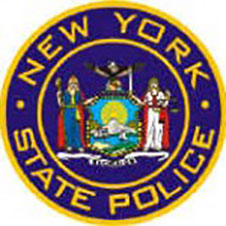 The New York State Police, along with local law enforcement agencies, will increase patrols to crack down on drunk and drugged driving and other traffic infractions this 4th of July weekend. In an effort to keep New York highways safe during one of the busiest summer holidays for travel, State Troopers will conduct sobriety checkpoints, along with speeding and seat belt enforcement details throughout the state.
The New York State Police, along with local law enforcement agencies, will increase patrols to crack down on drunk and drugged driving and other traffic infractions this 4th of July weekend. In an effort to keep New York highways safe during one of the busiest summer holidays for travel, State Troopers will conduct sobriety checkpoints, along with speeding and seat belt enforcement details throughout the state.
The STOP-DWI crackdown will begin on Saturday, July 1, 2017 and run through Tuesday, July 4, 2017. The campaign is funded through the Governor’s Traffic Safety Committee.
New York State Police Superintendent George P. Beach II said, “To prevent tragedies caused by impaired, distracted, aggressive or reckless driving, Troopers will be out in force this holiday weekend, and on the lookout for motorists who put others in danger. Our message is simple: If you drink and drive, it’s very likely that you will end up in jail. Stay safe, and don’t make a fatal decision that costs your life or someone else’s.”
“We appreciate law enforcement’s efforts to keep our roads safe during the 4th of July weekend and all year long,” said Terri Egan, Executive Deputy Commissioner of the New York State Department of Motor Vehicles and Acting Chair of the Governor’s Traffic Safety Committee. “Before you go out to celebrate, have a plan for how you, your family and friends will get safely home. You can pick a designated driver, call for a taxi, or now you will be able to use a ride-sharing app. We want all New Yorkers to have a worry-free Independence Day as they travel.”
Last year, the State Police issued nearly 11,000 vehicle and traffic tickets during the 4th of July weekend. Troopers arrested 206 people for DWI and responded to 756 crashes, which resulted in three fatalities. In addition, 35 counties and 121 agencies participated in the 2016 4th of July crackdown resulting in 212 DWI/DWAI arrests, six DWAI-Drug only arrests, 114 other arrests and 1,821 vehicle and traffic summonses.
During the enforcement, drivers can expect a number of sobriety checkpoints and DWI patrols. Law enforcement will also be looking for motorists who are using their phones and other electronic devices while behind the wheel. Drivers should also remember to “move over” for stopped emergency and hazard vehicles stopped on the side of the road when they travel New York roadways. State Police will also be targeting the illegal sale of alcohol to minors.
Troopers will be using both marked State Police vehicles and Concealed Identity Traffic Enforcement vehicles as part of the operation. The CITE vehicles allow Troopers to more easily identify motorists who are using handheld devices while driving. These vehicles blend in with every day traffic but are unmistakable as emergency vehicles once the emergency lighting is activated.
Data shows that the Fourth of July holiday period is especially deadly. According to the National Highway Traffic Safety Administration (NHTSA), during the July 4th period in 2015,146 people died nationwide in alcohol related crashes. Two thirds of those crashes involved at least one driver with a blood alcohol concentration of .15 percent or higher which is almost twice the legal limit.
If you drive drunk or drugged, you not only put your life and the lives of others at risk, you could face arrest, jail time, and substantial fines and attorney fees. The average drinking and driving arrest costs up to $10,000.
Arrested drunk and drugged drivers face the loss of their driver’s license, higher insurance rates, and dozens of unanticipated expenses from attorney fees, fines and court costs, car towing and repairs, and lost time at work.
The New York State Police and NHTSA recommend these simple tips to prevent drunk driving:
- Plan a safe way home before the fun begins;
- Before drinking, designate a sober driver;
- If you’re impaired, use a taxi, call a sober friend or family member, or use public transportation;
- Use your community’s sober ride program;
- If you happen to see a drunk driver on the road, don’t hesitate to contact local law enforcement;
- If you know someone who is about to drive or ride while impaired, take their keys and help them make other arrangements to get to where they are going safely.

